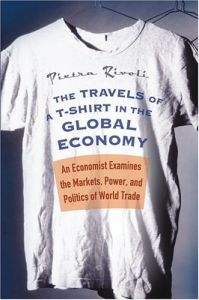Join getAbstract to access the summary!

Join getAbstract to access the summary!
Pietra Rivoli
The Travels of a T-Shirt in the Global Economy
An Economist Examines the Markets, Power, and Politics of World Trade
Wiley, 2005
What's inside?
Follow a T-shirt from cotton growing in Texas to Africa's used clothing market – a globalization case history.
Recommendation
In 1999, author Pietra Rivoli attended a Washington, D.C. demonstration against globalization. A young woman asked the crowd, "Who made your T-shirt?" before she described worldwide labor abuses and mistreatment of garment workers. That shouted question and the assumptions implicit in it stimulated the author’s imagination. She decided to find the answer. Her compelling book tracks T-shirts from the Texas cotton fields, through manufacturing in China, to consumers in the U.S. and to Africa’s used clothing market. In this interesting, original approach to the issues of globalization and industrialization, Rivoli shows the economic, political and social forces that come to bear on a T-shirt. Through she can’t literally track a single shirt step-by-step, she sustains that metaphor. Buying a shirt, she works her way backward in time and space to find its origins, or the origins (and eventual lifespan and demise) of such T-shirts, by relying on inference, deduction and reasonable assumption. Her most stunning, most negative conclusion is that - despite debates over free trade and allegedly exploitative markets - everyone involved seems devoted to avoiding market forces altogether. getAbstract.com says this book deserves its own T-shirt with "Must Read" on the front and "Highly Recommended" on the back.
Summary
About the Author
Pietra Rivoli is an associate professor at Georgetown University’s McDonough School of Business in Washington, D.C.

















Comment on this summary